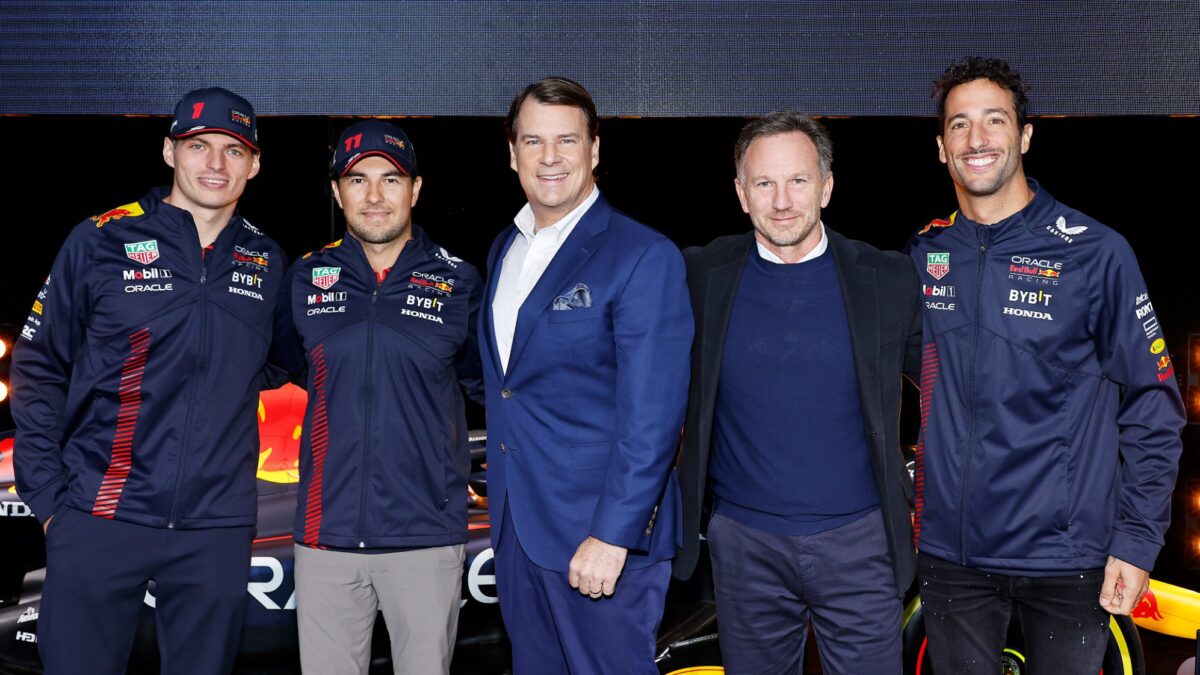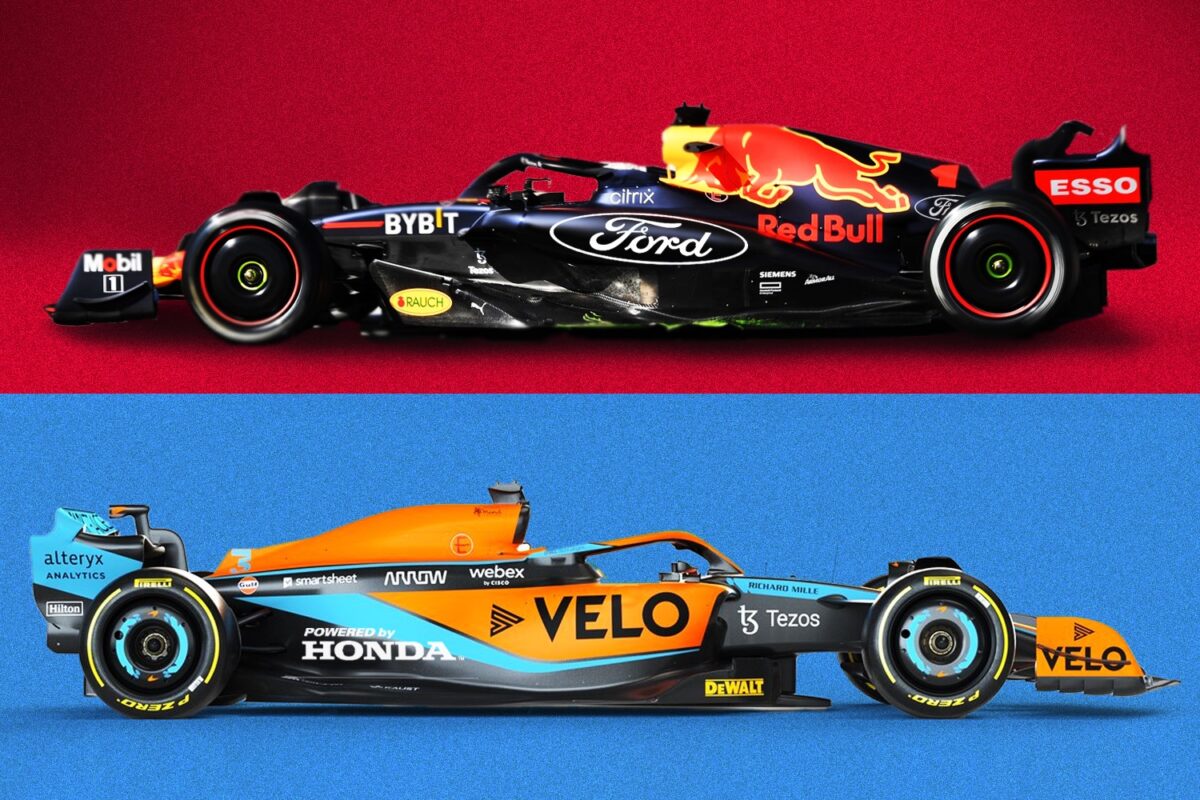Red Bull’s deal to bring on Ford as a powertrains partner ahead of Formula 1’s dramatic 2026 regulation changes took the motorsports world by surprise. The latest rumours? Honda is now considering getting back together with McLaren.
The 2023 Formula 1 World Championship hasn’t even started, and there’s already been plenty of action in the F1 world, with car manufacturers and teams all jostling to make sure they’re ready for the impending, dramatic 2026 regulation changes that’ll redefine the sport.
The latest news? Red Bull has just unveiled a huge technical partnership with Ford, one of the world’s biggest car brands, for the 2026 season and beyond. This big new deal will see Ford help develop a next-gen power unit to supply Red Bull Racing and its sister team AlphaTauri from 2026 until at least 2030.
This came as a surprise to some F1 fans, who were expecting that Red Bull and former engine partners Honda were going to team up again for 2026, despite Honda’s messy departure from the sport in 2021 – which necessitated the creation of Red Bull Powertrains, an in-house engine shop designed to maintain Red Bull’s Honda-designed engines until 2026.
Now it seems Honda has been left high and dry. The latest twist? Honda is reportedly now considering partnering back up with McLaren now that Red Bull is off the table. If you’re even passingly familiar with how that went last time, you’ll know why that’s so shocking… But some more context is needed.

The 2026 regulation changes
2026 will see a radical change in F1’s regulations, the most important of which are the new engine regulations. Aimed at simplifying the engines and making them more sustainable (and therefore more relevant to both consumers and car manufacturers), the 2026 engines will use 100% sustainable fuels and feature a beefier hybrid system that’ll supply up to 50% of the engine’s power.
These impending changes have already succeeded in tempting a number of car brands to join F1. Audi recently announced that they’re buying out Sauber (who currently runs as Alfa Romeo) and turning it into a works team, which will run its own Audi powertrain in 2026.
General Motors is also keen to join F1, partnering with Andretti Motorsports and launching a bid to become F1’s 11th team, something F1 fans have been clamouring for – although the GM/Andretti project isn’t as much of a certainty as Audi’s, for many reasons.
RELATED: Yeehaw: Cadillac & Andretti Plan To Join Formula 1 In 2026
Now Ford’s on board – but what Ford and Red Bull are doing is very different to what Audi’s doing or the GM/Andretti situation.
Ford’s main contribution to the partnership will be on the electrical side of the new power unit – the battery and hybrid tech. That aligns with Ford’s plans for electrification and helps Red Bull Powertrains, who currently have somewhat of a deficiency in that area of engine development.
@fordperformance Max Verstappen takes the ⚡ #SuperVan for a spin. #FordReturns @redbullracing @f1 @fordperformance ♬ Astronaut in the Ocean (Remix) – David Charlos
The Red Bull/Ford engine is mostly going to be a Red Bull Powertrains product. Red Bull’s invested all this money in Red Bull Powertrains (including poaching some top engine experts from Mercedes) so they don’t want or need Ford to provide them with an entire donk. It also helps Red Bull maintain much-desired independence and autonomy, which was a sticking point in their deal with Porsche falling through.
That suits Ford, too, because they don’t need to stump up as much cash, they get to work on the part of the engine that’s most relevant to their passenger vehicles, and they get to brand the engine as a Ford. It’s a win-win as far as everyone is concerned.
Well, except maybe Honda. This whole situation has left Honda with some real egg on its face. Not only did pulling out of F1 in 2020 mean that they lost the glory of Max Verstappen’s two world titles and Red Bull’s 2022 constructor’s title after having put in all the hard work developing the engine that powered those victories, but now they’ve lost the chance to jump back on board with Red Bull now that they’ve got a new CEO who wants to reverse course and be in F1 again.
Honda’s history with McLaren
The last time Honda teamed up with McLaren, it didn’t end particularly well. From 2015 to 2017, McLaren had a works team relationship with Honda which marked one of McLaren’s least successful periods in F1 history.
With those Honda engines, McLaren recorded 0 poles, 0 podiums and 0 wins, and suffered from an enormous amount of reliability issues. The relationship quickly turned acrimonious, with both sides pointing the finger at each other for the lack of performance. It also birthed some amazing Fernando Alonso quotes, who never hid his frustration at how slow the Honda engines were.
Yet McLaren and Honda have also enjoyed remarkable success together. In the late 80s and 90s, Honda engines helped McLaren secure 44 wins and four Constructor’s and Driver’s Championships with Alain Prost and Ayrton Senna.
What does McLaren want?
McLaren CEO Zak Brown has been vocal about his belief that customer teams can still win championships, but there’s no doubt McLaren would probably like to be a works team again.
Fundamentally, McLaren needs money. Badly. If Honda can come to the table with a decent engine and money to keep the lights on, we can’t see why McLaren would say no.
Both McLaren and Honda have changed a lot since they parted ways back in 2017. McLaren ditching Honda forced the Woking outfit to realise that they couldn’t blame all their problems on Honda, and they’ve since cleaned up shop significantly. Honda too has a new CEO who’s desperate to get back into F1 and has proven they can make race-winning engines again.
Watch this space.
